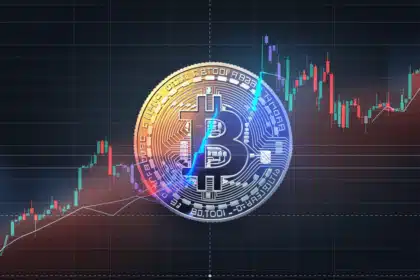Speculation is mounting that China’s central bank could become the force behind the next crypto rush through Yuan devaluation as financial stress between the United States and China mounts over the US’s proposed trade tariffs.
According to Bitmex Founder Arthur Hayes, US authorities’ decision to increase trade tariffs has seen China plan to retaliate, potentially through Yuan devaluation. Crypto experts believe that Beijing’s response could revive investor interest in cryptocurrencies, especially if they lose confidence in fiat currency structures easily affected by political pressure.

China Ready to Devalue Yuan
US President Donald Trump recently imposed a 104% tariff on Chinese imports, something Beijing has reacted to by allowing Yuan devaluation against the US dollar. The Yuan-to-USD exchange rate fell to its lowest point ever since 2023 April 8, highlighting that the People’s Bank of China was ready to allow its currency to fluctuate more freely. Crypto analysts believe the reaction to these moves could ignite the next leg of the Bitcoin bull market. As the emerging trade war escalates, Ju Wang, the head of Greater China FX at BNP Paribas, told Reuters:
“Expectation for China to eventually devalue the currency has jumped, and the pressure won’t go away easily.”

Trade War between Washington and Beijing
Ben Zhou, the co-founder and CEO of Bybit, the world’s second-largest cryptocurrency exchange by trade volume, also agrees that Yuan devaluation would counter the trade war between Washington and Beijing. The exchange that is popular for crypto derivative traders said last December that mainland China could easily trade on its platform without using VPNs even though using the Yuan wasn’t permitted. Zhou stated then:
“A lot of Chinese capital flow into BTC, [which is] bullish for BTC.”
China has historically used Yuan devaluation as a financial tool. For example, in August 2015, the People’s Bank of China devalued the currency by at least 2% in protest against the US dollar, precipitating the sharpest decline in several decades. Available market data shows that there was increased trading activity surrounding the flagship cryptocurrency during that period, something many analysts interpret as a signal that Bitcoin had turned into a hedge for capital seeking shelter from fiat disturbance.
Move Could Reignite a Bitcoin Flight
Similarly, when the Yuan fell below the psychological 7:1 ratio against the USD in 2019, it sparked a 20% surge in the price of Bitcoin. According to an insight from Grayscale Investments in their market report at the time, such fiat devaluations have always pushed more capital into the crypto market.
As a result, if Beijing went ahead with the planned Yuan devaluation in response to Trump’s proposed tariffs, the move could reignite a bitcoin flight that could strengthen BTC’s position as the more resilient alternative asset during times of monetary instability.
Conclusion
While the exact outcome may be hard to predict, history is on the side of the results that could easily follow the Yuan devaluation. Every time global situations threaten conventional economic systems, Bitcoin has consistently emerged as the exit ramp for capital whose investors seek safety. The current stage sets the next round of Bitcoin flight, which could influence the broader crypto market.
Frequently Asked Questions (FAQs)
What happens when currency is devalued?
Devaluation in the exchange rate lowers the value of the domestic currency of all other countries, especially with its major trading partners.
Who benefits from the depreciation of currency?
A country with a weaker currency relative to the rest of the world can help boost exports and shrink trade deficits.
How does currency devaluation impact Bitcoin?
Economic downturns caused by currency devaluation may increase interest in cryptocurrencies. Global events like pandemics or financial crises can also impact market behavior.
What would be the positive effects of Yuan devaluation?
The primary benefit of Yuan devaluation would be making China’s exports more competitive in global markets.
Appendix: Glossary to Key Terms
Currency devaluation: The deliberate downward adjustment of a country’s currency value.
Tariffs: A tax or duty to be paid on a particular class of imports or exports.
Trade war: A situation in which countries try to damage each other’s trade, typically by imposing tariffs or quota restrictions.





























